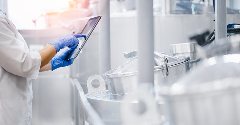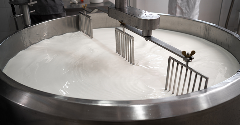News
Dannon makes 3-part pledge
2 May 2016Dannon has announced a pledge to its farmers, retail customers and consumers to further improve sustainable agriculture practices for its milk supply, to increase transparency for its portfolio of products and evolve to more natural and fewer ingredients for flagship brands.

Dannon has announced a pledge to its farmers, retail customers and consumers to further improve sustainable agriculture practices for its milk supply, to increase transparency for its portfolio of products and evolve to more natural and fewer ingredients for flagship brands.
Dannon’s Pledge key components:– Dannon commits to offer products coming from a more sustainable agriculture by working with its dairy farmer partners and their suppliers to progressively implement the use of sustainable agriculture practices and technology that leads to better soil health, better water management, an increase in biodiversity, and a decrease in carbon emission.– Dannon commits to bring all products from three flagship brands (Dannon, Oikos and Danimals) towards the use of fewer and more natural ingredients that are not synthetic and non-GMO. Importantly, Dannon also commits that for these brands the feed of its farmers’ cows will be non-GMO, within a transition period of 3 years. The ambition is to evolve the remaining brands over time.– To ensure full transparency for consumers, Dannon also commits to declare by December 2017 nationwide on label the presence of GMO ingredients in its products. In the meantime, if one state implements a GMO labelling requirement, since Dannon favors a nationwide labelling system, it will label the presence of GMOs nationwide according to the state requirements.The first impact of these changes will be visible starting July 2016, Dannon said, when the company will move to more natural ingredients which do not contain genetically modified ingredients for its flagship brands Oikos, Danimals and Dannon. These brands represent 50% of the company’s current volume. For the company’s foundation ingredient – milk – Dannon says it is going one big step further. Starting in 2017 and completing the transformation by the end of 2018, Dannon will work with its farmer partners to ensure that the cows that supply Dannon’s milk for these flagship products will be fed non-GMO feed, which it says is a first for a leading non-organic yogurt maker. To further improve transparency, by December 2017, Dannon’s labels will note the presence of GMO ingredients in all products in which such ingredients remain. Looking further into the future, Dannon said its ambition is to also evolve the other brands in its portfolio, beyond Dannon, Oikos and Danimals, over time.The changes will enable consumers to make everyday choices for themselves, their family and children Dannon said, consistent with their wish for natural and sustainable eating options, choosing which agricultural and environmental model they favour.The broad pledge started with the relationships the company has forged with its dairy farmers. Dannon began to evolve its milk supply model in 2010 to work directly with the farms that provide its milk. “We created a new way to work with dairy farmers to improve our shared sustainability priorities,” said Mariano Lozano, President and CEO of Dannon. “Our ambition is to produce healthy food that is affordable, creates economic and social value and nurtures natural ecosystems through sustainable agriculture. Although our journey is independent from that of our organic sister companies, we have learned a lot from and are inspired by Stonyfield and Happy Family.”As expressed in the company’s pledge, Dannon says its priorities for agriculture focus on soil, water, biodiversity, carbon and energy, and animal welfare. Dannon has already started work on the first phase of its commitment by encouraging practices, such as rotating crops, managing fertilizer, pesticide and herbicide application in the production of feed for a portion of the cows providing the company’s milk supply.“Dannon’s pledge to use more sustainable agricultural practices with their producer-partners will drive innovation and improvements and represents a bold and important step toward greater transparency,” said Dr. Molly Jahn, Agronomy Professor at the University of Wisconsin-Madison and former Deputy Under Secretary of Research, Education and Economics at the U.S. Department of Agriculture. “Dannon’s leadership in sustainability sets an ambitious benchmark for other dairy companies.”“It’s our mission to bring health through food to as many people as possible,” said Lozano. “And it’s our passion to help people enjoy the benefits of yogurt every day in a sustainable way. While this commitment is ambitious, we believe it’s necessary to continue to serve Americans using a sustainable and transparent model.”Related news

Consumers dislike faba beans’ sensory profile
3 Jun 2024
Consumers display low acceptance of faba beans, with sensory properties such as bitterness a core concern, a study suggests. However, for product varieties such as cocoa-free chocolate, this attribute could prove to be a benefit.
Read more
Food scientists uncover new way to preserve nutrient and flavour quality
29 May 2024
Researchers have developed a method that guarantees food safety for low-moisture products, such as dried milk, while maximising quality by retaining vitamins, minerals, and flavours, they say.
Read more
FDA scrutinizes milk pasteurisation over HPAI risk
28 May 2024
The US Food and Drug Administration (FDA) is undertaking additional scientific research work to ensure that approved pasteurization processes are rigorous enough after retailer milk tests showed contamination from Highly Pathogenic Avian Influenza (HPA...
Read more
Magnum targets ice cream lovers’ moods with new flavours
2 May 2024
Unilever-owned Magnum has released a suite of “mood-inspired flavours” as the 2024 ice cream season kicks off. The offerings, marketed as the Magnum Pleasure Express, are Magnum's first foray into the “mood-food” category.
Read more
The eight global food trends shaping the future of dining
23 Apr 2024
Unilever’s Future Menu Trend 2024 report identifies the global food trends shaping the food service industry, providing insights into changing consumer preferences that could provide inspiration for packaged food and drink brands.
Read more
Report outlines how the US interfered with marketing restrictions on formula across the globe
18 Apr 2024
A recent investigative report by ProPublica unmasked the extensive interference by the US government in international regulations concerning the marketing of formula.
Read more
Ultra-processed food intake in South Africa at concerning levels, study suggests
19 Mar 2024
As South Africa considers introducing front-of-pack warning labels and strict marketing limits for unhealthy foods, research has found that low-income South Africans get around half of their calories from ultra-processed foods (UPFs) – “a cause for con...
Read more
India’s mithai market develops new ingredient and flavour profiles
18 Mar 2024
Mithai is a hugely popular dessert and sweet snack in India and manufacturers are experimenting with unique ingredients, new flavour combinations, and healthier versions to capture new audiences.
Read more
Unilever and Perfect Day’s animal-free dairy dessert: Is precision fermentation the future of dairy?
6 Mar 2024
Perfect Day, a precision fermentation dairy supplier, has partnered with Unilever's Breyers, a brand of ice cream and frozen dairy desserts, to launch Breyers lactose-free chocolate frozen dessert.
Read more
Macauba oil emerges as potential rainforest-friendly palm oil alternative
1 Mar 2024
Producers and researchers consider the rainforest-friendly credentials of Macauba palm oil and whether its sustainability credentials offer an opportunity to replace palm oil.
Read more